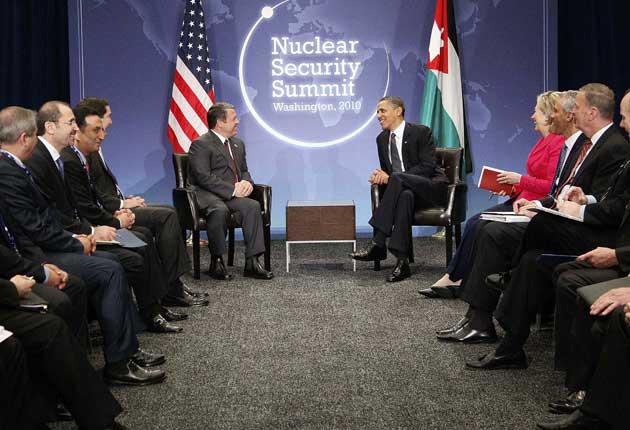Obama invokes spectre of al-Qa'ida to focus minds on nuclear deal
President tells leaders at summit: secure your loose atomic material or it will fall into terrorist hands

Your support helps us to tell the story
From reproductive rights to climate change to Big Tech, The Independent is on the ground when the story is developing. Whether it's investigating the financials of Elon Musk's pro-Trump PAC or producing our latest documentary, 'The A Word', which shines a light on the American women fighting for reproductive rights, we know how important it is to parse out the facts from the messaging.
At such a critical moment in US history, we need reporters on the ground. Your donation allows us to keep sending journalists to speak to both sides of the story.
The Independent is trusted by Americans across the entire political spectrum. And unlike many other quality news outlets, we choose not to lock Americans out of our reporting and analysis with paywalls. We believe quality journalism should be available to everyone, paid for by those who can afford it.
Your support makes all the difference.President Barack Obama will today attempt to corral the leaders of more than 40 nations into adopting a joint strategy to lock down all loose nuclear materials within four years.
The summit, which deliberately will not tackle sensitive issues such as expanding production of fissile materials by India and Pakistan, is meant to give new impetus to combating the dangers of terror networks like al-Qa'ida acquiring and detonating either nuclear or so-called dirty bombs. Mr Obama has introduced the gathering by evoking a doomsday scenario of terrorists trying to detonate an atomic device in "New York City, or London, or Johannesburg".
Mr Obama, who has made non-proliferation the main focus of his energies in the past week, will tell the other world leaders that the transfer of materials that could be used in such devices, like plutonium and enriched uranium, now presents the single greatest threat to world security.
The communiqué tonight will not be binding, but delegates, who include the leaders of Russia, China, Pakistan, India, South Africa and most European states, will be pressed to provide firm details both of the steps they will take to secure the materials and the money they mean to provide to help it happen.
Angela Merkel, the German Chancellor, last night said her government was ready to provide new financing to strengthen the UN nuclear watchdog, the International Atomic Energy Agency in Vienna. "We are ready to pledge additional finances to make this happen," she said.
Like some other Europeans, Ms Merkel is anxious to emphasise the particular danger presented by "dirty bombs" rather than actual nuclear ones, which, if detonated, would shower large areas with radioactive materials which could leave affected populations with long-term health hazards. These sorts of weapons "must not under any circumstances" fall into the hands of terror groups, she suggested.
Mr Obama insisted that the outcome would be meaningful. Before the conference opened, the White House said that Ukraine will get rid of its stockpile of highly enriched uranium, enough to build several nuclear weapons, by 2012.
"Our expectation is not that there's just some vague, gauzy statement about us not wanting to see loose nuclear materials," said Mr Obama. "We anticipate a communiqué that spells out very clearly, here's how we're going to achieve locking down all the nuclear materials over the next four years, with very specific steps."
And he spelled out the risks of inaction. "We know that organisations like al-Qa'ida are in the process of trying to secure a nuclear weapon – a weapon of mass destruction that they have no compunction at using," the President said as the first of the delegations arrived in Washington. "If there was ever a detonation in New York City, or London, or Johannesburg, the ramifications economically, politically, and from a security perspective would be devastating."
Today's meeting, which opened with a working dinner last night, was born of Mr Obama's pledge a year ago to pursue a nuclear-free world.
It is one of four pillars of a strategy that has already featured the signing of a new arms-reduction pact with Russia and the release last week of a new US nuclear posture that envisions a reduced dependence on nuclear weapons for its defence. Next month, meanwhile, sees the start of a new review of the Non-Proliferation Treaty in New York.
While the leaders of Pakistan and India are both in Washington, officials admitted there would be no serious discussion of their race to produce materials to expand their nuclear arsenals. By some estimates, there is already enough nuclear material floating around to make as many as 100,000 new atom bombs.
"President Obama is focusing high-level attention on the threat that already exists, and that's tremendously important," said former US Senator Sam Nunn, who leads a think-tank on safeguarding global nuclear stockpiles. "But the fact is that new production adds greatly to the problem."
The ability of Pakistan to safeguard its stocks is of particular concern because of the Taliban insurgency in the country and the presence of al-Qa'ida forces there.
It is a worry that Mr Obama attempted to play down however. "I am confident that Pakistan has secured its nuclear weapons," he told The New York Times. "I am concerned about nuclear security all around the world, not just in Pakistan but everywhere."
Join our commenting forum
Join thought-provoking conversations, follow other Independent readers and see their replies
Comments